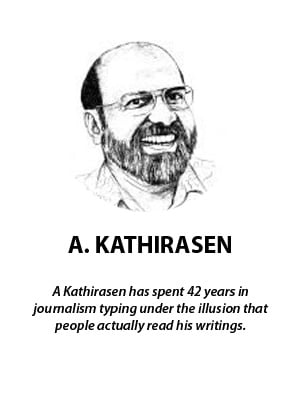
The younger generation of Malaysians may not be aware of the immense struggles our elders went through in securing independence for Malaya and later working to forge a new nation called Malaysia.
As we celebrate 63 years of Merdeka, and 57 years of Malaysia Day, we should make an effort to get acquainted with some of the colourful figures and the challenges that our leaders and the nation faced, especially in the formation of Malaysia.
Many of us recall or have heard or read about the communist insurgency and the lives lost in battling them. Many would have read or heard about opposition from Indonesia and the Philippines to the formation of Malaysia. Indonesia had eyes on Sarawak while the Philippines wanted Sabah.
But most may not be aware that there was also internal opposition to the formation of Malaysia which was proposed by Malayan prime minister Tunku Abdul Rahman in 1961.
Some groups in Singapore, Peninsular Malaysia, Sabah and Sarawak objected to the merger. In Singapore, for instance, five opposition parties ganged up against the merger which was fully supported by then prime minister Lee Kuan Yew and his People’s Action Party.
The communist party, which had a presence in Malaya, Singapore and Borneo was against it too; and a group which was given the name Clandestine Communist Organisation of Sarawak created much trouble in that state.
Most opposition parties in the peninsula were against it for one reason or another, causing minister V T Sambanthan to say it looked as if the nation was facing two wars: one externally (from Indonesia and the Philippines) and one internally (from opposition parties).
Opposition parties, such as the Malayan People’s Socialist Front and the Sarawak United People’s Party or SUPP, spoke up against the merger. In fact, SUPP was one of the most vocal as it did not want Sarawak to, yet again, be under the influence of a “foreign power”. Like the SUPP, there were also several groups in Sabah and Sarawak who felt this was part of a larger British plan to continue its hegemony over territories in the region.
In Malaya, one of the loudest voices against merger was the PMIP, which later became known as PAS. In opening the general assembly of the PMIP in January 1962, its leader Burhanuddin Al-Helmy said: “We will fight the plan everywhere we can. If it is accepted, it will not only endanger, it will destroy the rights of the Malays.”
Burhanuddin and the PMIP were then pushing for a merger of Malaya, Indonesia and the Philippines, to be called Melayu Raya. “Only such a federation – the Melayu Raya – can put the Malays on the same footing as other people throughout the world,” he told the gathered members.
In the August 1963 sitting of Parliament there was a heated debate over the formation of Malaysia. Opposition leaders such as DR Seenivasagam cautioned against rushing into forming Malaysia, as at that time Indonesian president Sukarno had openly threatened Malaya over the merger, and to listen to opposition voices as well.
Another well-known parliamentarian, V David, then the Socialist Front’s Bungsar (it was spelt that way previously) MP also spoke up against rushing to form Malaysia. One of the reasons he gave, which I find very interesting, was that one day Lee Kuan Yew would “stab” the federation government in the back.
Zulkiflee Muhammad of PMIP, the Bachok MP, said the Alliance had not received any mandate from Malayans to form Malaysia and that such a merger was not in its 1959 election manifesto.
Just 10 days before Malaysia Day, the PMIP-ruled Kelantan state sued the federal government and the Tunku, saying the Malaysia Act had been drawn up without the consent of the sultan and that it was illegal. It sought a declaration that the Malaysia Act was null and void. The Kelantan government also filed for an injunction to stop the federation government from implementing the Malaysia Act on Sept 16.
The then Kelantan menteri besar Ishak Lufti explained that the grouping of Malaya, Singapore, Sabah and Sarawak to form Malaysia implied that Malaya was one state and that “it deprives the State of Kelantan of its independent entity”.
He said: “It is beyond the constitutional rights of Malaya’s Parliament to finalise the Malaysia Act, which means amending the Federal Constitution, with the mere passing of a resolution in Parliament.
“The State of Kelantan, like any other state in the Federation of Malaya, is a sovereign state and, therefore, it is only His Highness the Ruler who can enter into a treaty on behalf of the state. But in this case, the agreement presumed to have been entered into on behalf of the state is void and inoperative.”
On Sept 14, the then chief justice James Thomson rejected Kelantan’s application to restrain the implementation of the Malaysia Act on Sept 16. Thomson ruled that the federation government had not violated the Constitution in bringing about the Malaysia Act and that Parliament had not contravened its powers by passing the Act.
It was also the last act of the court under the Federation of Malaya.
Can you imagine it? If Kelantan and the PMIP had succeeded, we may not be celebrating Malaysia Day on Sept 16. Who knows by how many months or years it would have been delayed.
Who knows, the merger may not have taken place at all and Malaysia may not exist.- FMT
The views expressed are those of the author and do not necessarily reflect those of KKMtT.


No comments:
Post a Comment
Note: Only a member of this blog may post a comment.